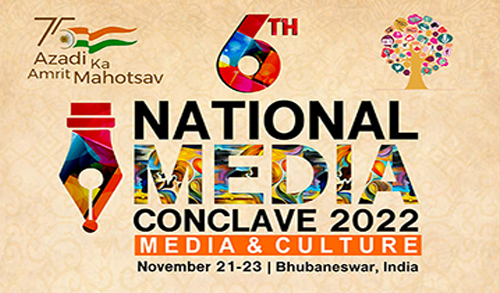6th National Media Conclave

6th National Media Conclave INTRODUCTION 6th National Media Conclave Media, as a powerful social system, plays an important role in creating a person’s sense of reality. It proved to be influential on the belief that in its wider cultural sense, the media largely reinforced those values and norms which had already achieved a wide consensual foundation. The complimentary and independent media are the most substantial requirements for the utility of democracy. The mass media are less effective in this process if they use a hostile perception and more powerful when “persuasive press inferences”. The persuasive press inference depicts that individuals frequently presume public opinion from perceptions of the content of media coverage, and assumptions regarding the content that have considerable influence on people. Culture is learned, not inherited and transmitted from generation to generation. It “is an integrating mechanism”, the social or normative glue that holds together a potentially diverse group of organizational members. The source of new cultural elements in a society may also be another society. The cultural elements of one culture borrowed and incorporated in recipient culture are called diffusion. The processes of diffusion and acculturation bring some kind of cultural changes or shift in the culture. Sometimes diffusion is due to intermediate contact that occurs through the third party. Mass media has a political and a persuasive power over us. Radio, TV, the press etc. can manipulate whole societies. Political propaganda, advertising and the so-called ‘mind-bending’ power of the media are long-standing causes of debate and concern. Media has a great effect on our social behaviour which is a part of our culture. When communicating messages among different cultures, media on the other side also faces severe challenges. According to Jenkins (2006), there is definite paradigm shift as how the content of media is being produced and circulated. Scholars theorizing the current trend to participatory culture emphasized user’s strong preference to share knowledge and culture in communities. Media has given new meaning to cultural sharing and communication. Louis Writh and Talcott Parsons have “emphasized the importance of mass media as instruments of social control.” Media is basically a powerful presence in people’s lives. Media plays a cardinal role in disseminating our daily life cultural practices. It is said to reflect our culture norms and values and it has widened our choices and increased cultural expression with flow of information at planetary level. Cultural values also shape mass media messages when producers of media content have vested interests in particular social goals. People can produce and symbolise cultural identities through the media. In this regard, the Organising Committee of 6th National Media Conclave-2022 invites you to participate in the Eastern India’s biggest literary and academic extravaganza as a delegate and present a paper on any sub-theme mentioned below. Selected research papers will be published in a peer-reviewed journal. VIEW MORE


